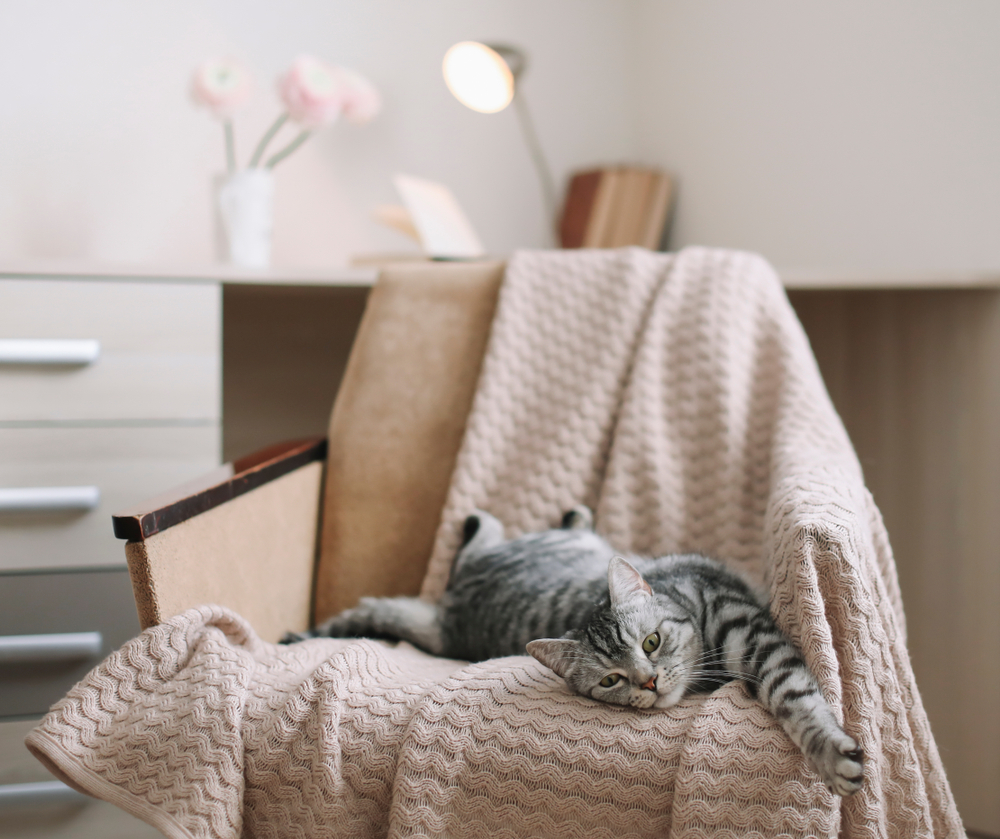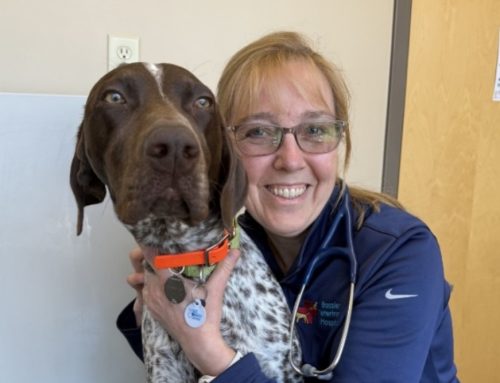Summer is here, and along with cookouts and vacations come sparkling, loud fireworks celebrations. July Fourth celebrations may seem to come earlier each year, and many pet owners will experience shaking, nervous pets who are frightened of the loud booms that fill the neighborhood skies. Noise aversion, especially to fireworks, is a common problem in pets, especially dogs. Unfortunately, Independence Day is the busiest day for animal shelters because of the large numbers of pets who go missing, since they respond to their fireworks aversion by running away from the loud noises. Our Bassler Veterinary Hospital team wants to ensure your fireworks-fearing pet is safe and calm this summer, so we compiled five tips to help your four-legged companion.
#1: Start sound training your pet
Pets who have a noise aversion will have a fearful or anxious response to a specific noise, with fireworks one of the most common triggers. Many pet owners dread New Year’s Eve and July Fourth, because of the many fireworks celebrations. Additionally, pets with noise aversion are more likely to suffer from other fear disorders, such as separation anxiety, which can make caring for their pet challenging for pet owners.
Year-round sound training can help ease your pet’s fireworks anxiety, and prepare them for July Fourth and New Year’s celebrations. Carefully monitor your pet during training sessions, and immediately stop the training if they show any fear or anxious behavior. Sound training methods include these steps:
- Start by playing a low volume fireworks sound, giving your pet small amounts of their favorite treat, and ample praise, when they remain calm.
- Next, turn off the fireworks sound, and stop giving them treats.
- Repeat this process with a low sound level, until your pet anticipates their favorite treat when the fireworks sounds are playing.
- Once your pet is comfortable with the process, gradually increase the volume of the fireworks, and use a variety of sound types, so that your pet associates the noises with treats and praise.
#2: Dress your pet for the occasion
Properly “dressing” your pet will decrease their chances of becoming a July Fourth missing pet statistic. Adding a festive collar or bandana is a great way to include your pets in festivities, but ensuring they are always wearing a secondary identification tag, their microchip is functioning, and their registration is current, is critical. Always use a leash when taking your pet outside during fireworks celebrations, including when they are in the backyard. Additionally, an anxiety vest, or thundershirt, which provides gentle pressure around your pet’s torso, may help decrease your pet’s stress during fireworks celebrations.
#3: Bring your pet for a veterinary examination
Noise aversion signs often mimic other underlying medical problems, so you must ensure your pet receives a veterinary examination. Noise aversion signs may include trembling, panting, pacing, vocalizing, inappropriate urination or defecation, hiding, and sudden, destructive behaviors. Our Bassler Veterinary Hospital veterinarian may recommend blood tests to check your pet’s organ health, and ensure that any necessary prescription noise-aversion medications are safe. Pets with severe anxiety signs may be prescribed short-term sedatives, or serotonin-increasing medication, to help them feel comfortable during fireworks celebrations. Pets, like people, react differently to sedatives, and determining your pet’s effective dose can take time, so ensure you schedule an appointment in the months or weeks prior to any fireworks.
#4: Adjust your pet’s routine
Adequate daytime exercise and playtime with your pet will help tire them out in advance of fireworks. However, always exercise your pet during the cooler morning hours, so they don’t overheat. A tired pet is more likely to sleep in the evening during fireworks noise. Also, adjust your pet’s mealtimes and bathroom breaks, so they are not during peak fireworks times. If bathroom breaks are needed after dark, always keep your pet on a leash, including in your fenced backyard.
#5: Provide your pet a safe space

Ensure your pet has access to a safe space, such as a crate, quiet room, or the back of a closet, where they can retreat during a fireworks display. Play calming music to help muffle fireworks noise, and speak to your pet in a calming and reassuring manner, to help ease their anxiety. Provide your pet with comfort items and reassurance, which may include their favorite toy or blanket. Pheromone sprays, such as Adaptil or Feliway, can also decrease your pet’s fireworks anxiety, and promote a sense of well-being.
Call Bassler Veterinary Hospital if you have any questions about your pet’s noise aversion, or to schedule an appointment to check their microchip. We want to help ensure you and your pet are prepared for July Fourth.








Leave A Comment